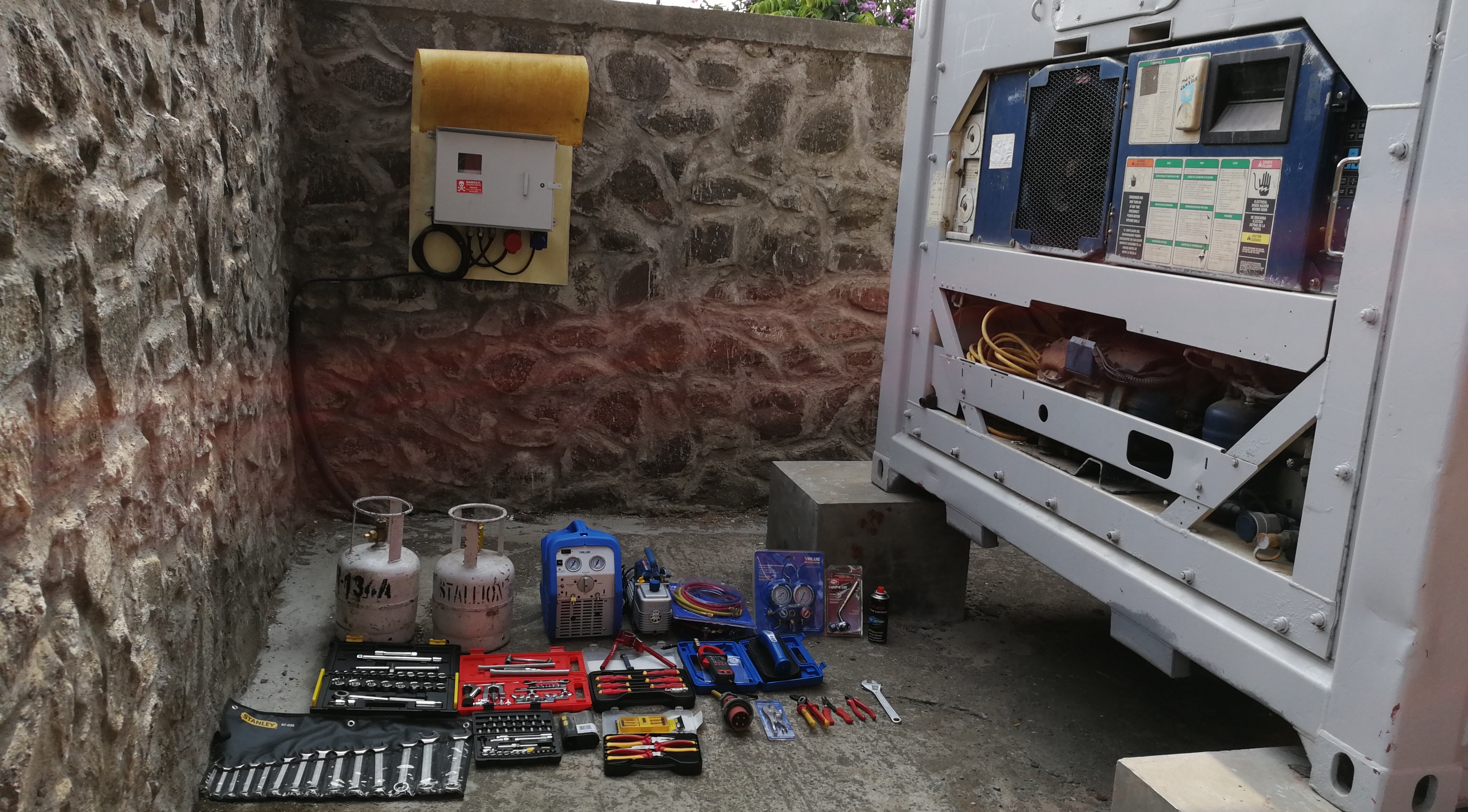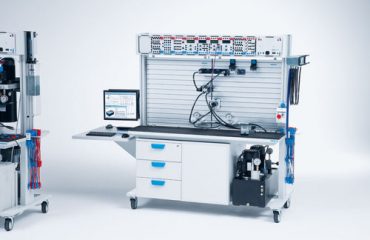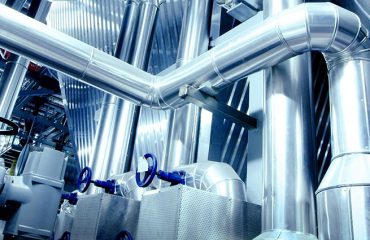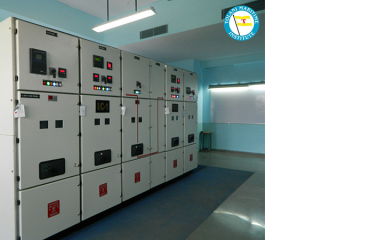
Reefer containers carry cargo of perishable nature. Hence they require proper operation and maintenance throughout transportation. It is essential that Marine Engineers and Electrical Officers are well trained for same with adequate knowledge and skill to operate, maintain and troubleshoot the systems. These courses improve the same by lectures, group discussions, hands on training, simulation exercises, and logical troubleshooting with a refrigerated container and associated means.
1. Basic Reefer Container Operation & Maintenance Course
Duration: 2 days
Objective: To provide participants with basic skills and knowledge about operation and maintenance of reefer containers.
Eligibility: Students undergoing Diploma or Degree Programs; Professionals in related fields
Course Content:
First day:
- Basics of refrigeration and the operation of a vapour compression system.
- Various terminologies used in refrigeration system.
- Refrigerant (CFC, HCFC and HFC) and their differences.
- Latest F-gas regulation, GWP and the importance of refrigerant recovery.
- Difference between various refrigerants (gases) based on their saturation temperature at atmospheric pressure.
- Need for a reefer container and types of refrigerated cargoes.
- Additional features of reefer container e.g. controlled atmosphere systems, Maxtend regulated system and humidification system.
- Safety precautions to be taken while working in a CA reefers.
- Need of USDA sensors and temperature recording systems in reefers.
- Air flow diagram of a reefer container.
- Need of the various tools e.g. refrigerant recovery compressor, vacuum pump, manifold gauge, electronic leak detector, recovery cylinder.
Second day:
- Refrigeration system schematic of a Carrier, Thermoking, Daikin and Starcool reefer containers.
- Pressure / temperature chart of a particular refrigerant.
- Electrical circuit schematic and wiring diagram of a carrier reefer container.
- Cold checks before connecting electrical power supply in a reefer container.
- Operation of the reefer container (Changing set point, pre-trip inspection, code selections, manual defrosting).
- Connecting a manifold gauge to check the pressure of the refrigerant.
- Pumping down the unit.
- Filling refrigerant in liquid side and gas side.
- Various alarm codes and their consequences.
- Trouble shooting procedure on basis of the alarm codes.
- Emergency operation in case of automation failure.
Course Fees:
INR 4,000 + taxes (excluding boarding & lodging*)
(*Boarding & lodging is available inside the campus at additional charges)
Application Form:
Click here for downloading application form
2. Advanced Reefer Container Operation & Maintenance Course
Duration: 3 days
Objective: To provide participants with Advanced skills and knowledge about reefer containers
Who Should Attend: Operational Level Engineers, Management Level Engineers, Electrical Officers, ETO students and Industry Professionals related to container refrigeration
Course Content:
First day:
- Basics of refrigeration and the operation of a vapour compression system.
- Various terminologies used in refrigeration system.
- Classification of refrigerant (CFC, HCFC and HFC) and their differences.
- F-gas regulation and GWP.
- Difference between various refrigerants (gases) based on their saturation temperature at atmospheric pressure.
- Need for a reefer container and types of refrigerated cargoes.
- Types of reefer container (general, controlled atmosphere systems, Maxtend regulated system).
- Precautions to be taken while working in a CA reefers.
- Need of USDA sensors and temperature recording systems in reefers.
- Air flow diagram of a reefer container.
- Need of the various tools eg: Refrigerant recovery compressor, vacuum pump, manifold gauge, electronic leak detector, recovery cylinder.
Second day:
- Refrigeration system schematic of a Carrier, Thermoking, Daikin and Startcool reefer containers.
- Pressure / temperature chart of a particular refrigerant.
- Modulation valve operation.
- Electrical circuit schematic and wiring diagrams of a carrier reefer container.
- Cold checks before connecting electrical power supply in a reefer container.
- Operation of the reefer container (Changing set point, pre-trip inspection, code selections).
- Identification of the correct operation of the system.
- Identification of the fault in the system if temperature is not in range using code select, tools and P/T chart.
- Identification of the condition of the various component of the system (Compressor, Condenser, evaporator, expansion valve, modulation valve, filter-drier).
- Connection of a manifold gauge to check the pressure of the refrigerant.
- Front seating and back seating of the service valve.
- Pumping down the unit.
- Filling of refrigerant in liquid side and gas side.
- Various alarm codes and their consequences.
- Trouble shooting procedure on basis of the alarm codes.
- Emergency operation in case of automation failure.
Third day:
- Recovery of refrigerant from the system using recovery compressor and storing it in the recovery cylinder.
- Evacuation of the system using vacuum pump.
- Refilling the system with refrigerant.
- Checking for leakage using electronic leak detector and soap solution.
- Demonstration of the usage of tools like pipe bender, flaring tools, swaging tools, butane torch brazing etc.
- Trouble shooting the electrical faults in the reefer container and emergency procedures (if spare parts not available) in case of critical failures.
Course Fees:
INR 12,000 + taxes (excluding boarding & lodging*)
(*Boarding & lodging is available inside the campus at additional charges)
Application Form:
Click here for downloading application form
Note:
Minimum no. of participants for each course: 5
Maximum no. of participants for Basic Reefer Container Operation & Maintenance Course: 20
Maximum no. of participants for Advance Reefer Container Operation & Maintenance Course: 10
Additional Information:
For booking and any other information contact:
Course Co-coordinator
Mr Lloyd Samuel V.
Assistant Professor (Electrical & Electronics)
Tolani Maritime Institute, Induri, Pune-410507
Tel: 02114-669659, Email: lloydv@tmi.tolani.edu or info@tmi.tolani.edu



